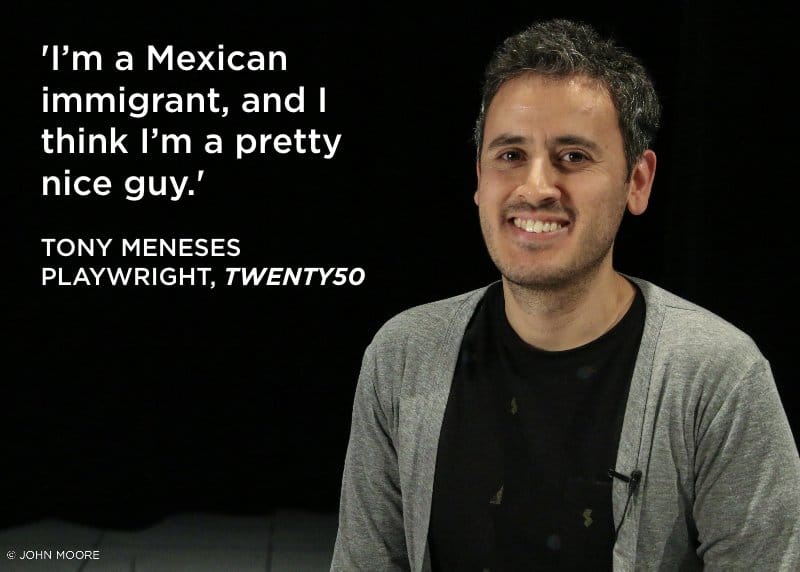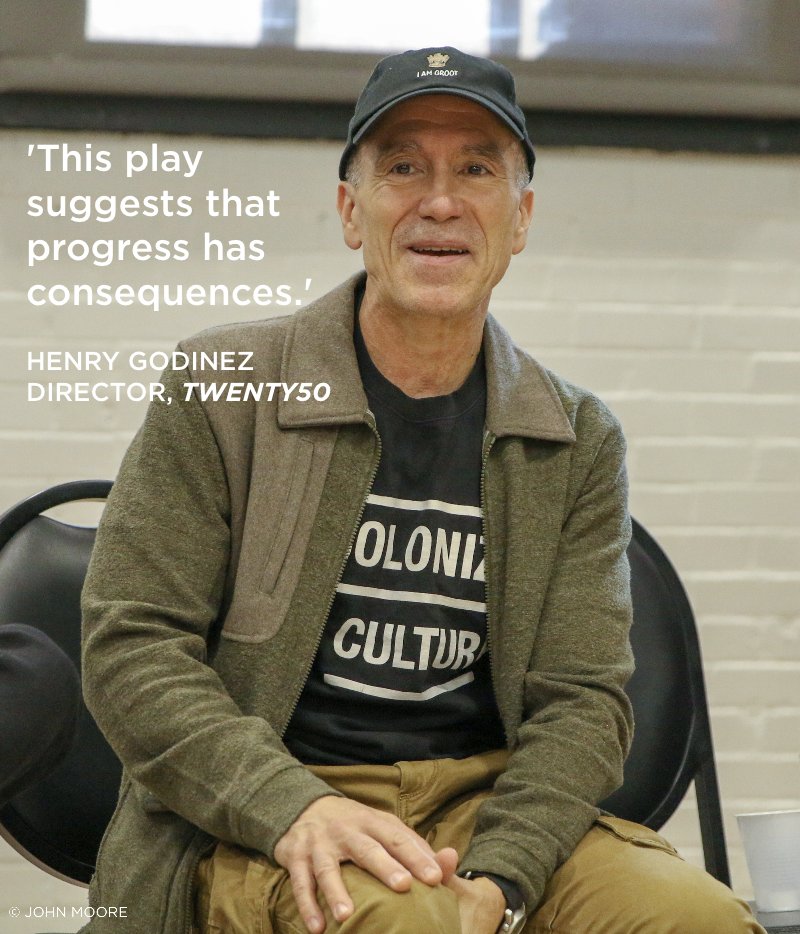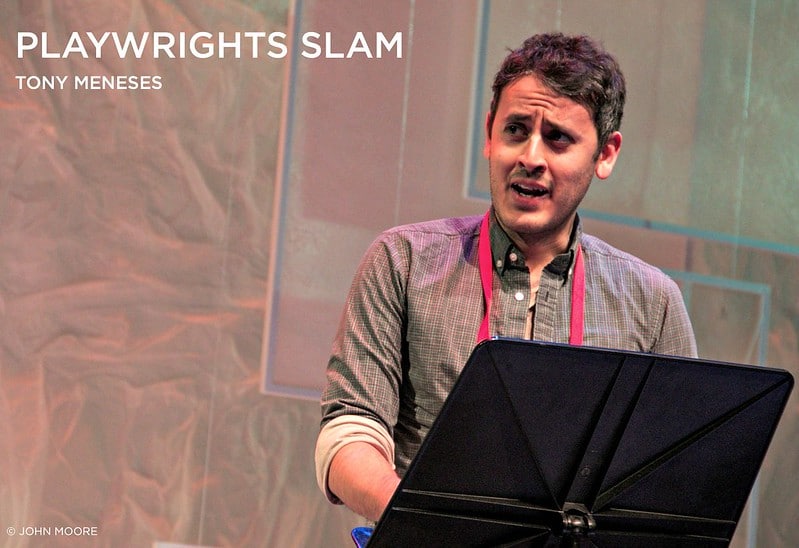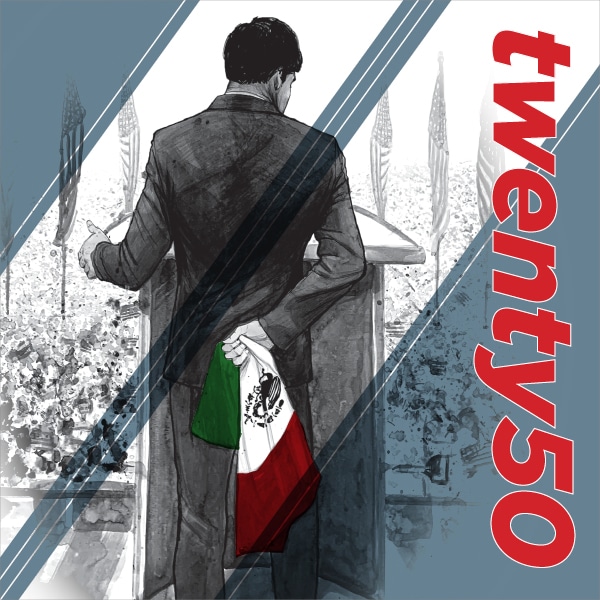DCPA NEWS CENTER
Enjoy the best stories and perspectives from the theatre world today.
Enjoy the best stories and perspectives from the theatre world today.

Photo by John Moore.
Playwright Tony Meneses was intrigued when he came across a Pew Research Center study that predicted 2050 will be the year the U.S. population will no longer have a white majority. That, in itself, could make for a compelling “near-future” pot-boiler.
Imagine: What will white people do to maintain power when they no longer have the numbers? Form coalitions with minority populations? Refuse to cede power? Take up arms?
Meneses takes this census scenario one step further in his world-premiere play, twenty50: What if, in order to maintain their supremacy, white people simply absorb Latino people into their own population? Just as happened long ago with the Germans, Jews, Greeks, Italians, Irish and other groups once considered “less than” white.

Photo by John Moore.
There would be many ways to explore that storyline, most from the white point of view. Meneses is more curious about the Latino perspective.
“How can we resist that opportunity?” Meneses wondered. “But what would be the cultural cost? And would we be complicit?”
twenty50 centers on a Mexico-born immigrant who is now running for Congress in middle America. He came to the United States as a boy with his father, who then worked on a farm for 25 years. The compromises this man now must make to win can be boiled down to one telling question: Will he go by the name Andres — or Andy? (This might remind you of a certain Texas Senator born Rafael Edward — but is more commonly known as Ted. Meneses is not naming names, but, “I will say there are conservative Latino politicians out there right now whose policies don’t protect their own people,” he said.)
Andres — or Andy — “is now at a crossroads where he has to decide whether he identifies as Latino or white, and consider how that may help or hinder his campaign,” Meneses said. His campaign manager is a Latino who believes the man cannot be seen as Mexican and still win.
‘I believe twenty50 is a play for Americans — and we’re all Americans.’ Playwright Tony Meneses
What Latino people might be willing to do for a slice of America’s power pie is the heart of what twenty50 is about, said Director Henry Godinez. Because Andres must decide how much he should assimilate into the broader white culture, while still being perceived as “Hispanic enough” by his own Latino community.
“What I love about this play is that it brings up a very difficult and yet very honest conversation that is going on within the Latino community right now, which is this: What are the consequences of a future in which Latinos have the luxury of no longer being considered ‘the other’?” Godinez said. “What I think the play does so beautifully is that it suggests progress has consequences.”
The biggest being its impact on cultural identity. Thirty more years of blending will surely further blur the distinctions between skin colors, that much is certain. Meneses, who teaches at Fordham University, and Godinez, who teaches at Northwestern, are already seeing it among their many multicultural students.
“I have light-skinned students who actually self-identify as ‘white-passing Latino,’ ” Meneses said. “And they acknowledge that white privilege as part of their identity. They may be Latino or Latina, but they are starting to have this very keen awareness about the history of how white supremacy and race politics work, and how they intersect with the systems that have put historically systemic oppression into place.”
twenty50 is a family drama. It’s a political thriller. It’s a classic American Dream story. It’s a comedy. It’s a cautionary tale. It is also, Meneses says, “my social justice dystopia.” Especially to those who assume that an America without a racial majority will inherently mean a more harmonious one.
“People might walk into twenty50 with the idea that this is going to be a fun diversity story about how racism is finally over,” Meneses said. But the play actually argues the opposite.
“twenty50 raises important questions about power and assimilation and how that all intersects with race and identity. It asks big questions about what is America? Where is America going? And who gets the privilege of being considered ‘us’?”
Meneses didn’t write his play as a specific response to who is currently occupying the White House, but he admits “the audience is inevitably going to receive the play based on whatever is in the headlines at the time it is performed,” he said. Godinez expects the play to evoke strong personal reactions, especially during a presidential election year in which immigration is again a central issue.
“For many people, America is no longer a place where refugees and immigrants see a beacon of light,” Godinez said. “They skip right over America and go to Canada — literally. My hope is that this play will make people ask, ‘Is that really the country we want to be?’ And specifically for the Latino community who see the play, given the potential power of our vote: ‘Is that the country we want to create with our vote?’”
Meneses strongly identifies as a Mexican immigrant himself who moved here with his family from Guadalajara when he was 8 months old.
“This is what I write about,” he said, “and given where we’re at right now, it’s such an important thing for me to give voice to the Mexican immigrant, because I want to demystify that. I’m a Mexican immigrant, and I think I’m a pretty nice guy. But if you say the words ‘Mexican immigrant’ to certain people, they think that’s a terrifying thing. I hope that I can dispel a lot of the (bleep) out there about who people think we are.
“My hope is that when audiences meet the Salazars, they don’t see a Latino family — but simply a family. I believe this is a play for Americans — and we’re all Americans.”
John Moore was named one of the 12 most influential theatre critics in the U.S. by American Theatre Magazine. He has since taken a groundbreaking position as the Denver Center’s Senior Arts Journalist.
Here is more of John Moore’s conversation with Tony Meneses and Henry Godinez:
John Moore: You are both college teachers. Tell me about your day-to-day academic lives.
Tony Meneses: I’m an adjunct professor at Fordham University in The Bronx and at Stevens College in Hoboken N.J. Pretty much every Monday through Thursday I teach two classes a day, and then I spend a lot of time otherwise grading. I devote some of my daytime schedule to my writing as well.
Henry Godinez: I split my time between teaching acting at Northwestern and at the Goodman Theatre in Chicago, where I’m the resident Artistic Associate Director. Right now I’m working on our version of the Colorado New Play Summit. Ours is called the New Stages Series.
John Moore: Tony, when you talking about “whiteness,” you are clearly not talking strictly about skin color. What does that term mean to you?
Tony Meneses: Race is a construct. And racism in this country operates on the binary of us and them. So who gets the privilege of being considered ‘us’? That has evolved. It’s not literally biology. It’s not literally genealogy. It’s group identification. Irish people, Greek people and Jewish people weren’t always considered white, but as immigration numbers began to shift, it became beneficial for white people to include more people to maintain their supremacy . So what this play posits is that that same evolution is now happening with the Latino community.
John Moore: But isn’t skin color what makes your premise radically different from those other examples? The Irish may have been treated as the lowest social class, but they were also inarguably white.
Tony Meneses: Yes, but Italian people aren’t exactly the most traditionally “white people” – depending of course on geography. There are white-looking Latino people within our own group, and so for them, color does not matter.
2020 Colorado New Play Summit plays and playwrights announced
John Moore: Henry, do you believe a person’s sense of cultural identity is growing more or less important as we approach the mid-21st century America?
Henry Godinez: I think the majority the young people I work with, who are mostly ages 18 to 21, identify as multicultural students these days. They feel very strongly about self-identifying as a particular cultural group that one of their parents is from. But they are also acutely aware of being made to feel like they are somehow “less than” or not cultural enough – and that’s sometimes troubling.
John Moore: Tony, how has your overall experience with the Denver Center been, from when you were first commissioned to write a new play to having twenty50 featured in last year’s Colorado New Play Summit, to its impending world-premiere production?

Tony Meneses wrote the first scene of ‘twenty50′ at the 2017 Colorado New Play Summit, and read it at the late-night Playwrights’ Slam. Photo by John Moore.
Tony Meneses: It’s all been very auspicious for me from the very beginning. [New Play Director] Doug Langworthy encouraged me to follow my instincts. I offered several different ideas and his response was, “Which one do you want to write?” I wrote the first scene of twenty50 when they had me out here as a guest all the way back at the 2017 Summit. In fact, I read the first scene at that year’s late-night Playwright’s Slam. That scene is still the first scene of the play today. So to me, it’s just been such a beautiful process to unfold – and the 2019 Summit was the real culmination of all that effort. To have two weeks to work with the play, to test it with two different audiences and to get their direct feedback really changed and opened up the play so much. It was so helpful. I don’t know any other place that develops new plays like this, and for me it has been great.
John Moore: Henry, directing twenty50 as a reading was your first Summit experience last February. What were your impressions?
Henry Godinez: It was so exciting. The energy in that building and throughout the Summit was just remarkable. I loved going to the other readings. I loved chatting with all the different artists who were here. For Tony, the experience was priceless. But in a broader way, the chance to just mingle and converse with colleagues from around the country and put our fingers on each other’s pulses about what’s going on in the field was just such a wonderful opportunity.
John Moore: What would you like to say about the overall caliber of your cast?
Tony Meneses: I’m most excited about the very broad representation of different kinds of Latino actors we have in the cast, especially in terms of this conversation we’re having around colorism. Every kind of Latino person is represented within our cast, and that is very exciting for me.
John Moore: What does it mean to you both that the first place this play gets to be seen is Colorado, which once was part of Mexico?
Tony Meneses: I think it’s perfect.
Henry Godinez: Yes, Colorado is literally a Spanish word, and it was part of Mexico. You cannot ever forget that.
John Moore: Last words?
Tony Meneses: At the end of the day, I’m giving a platform to brown bodies, Latino bodies and immigrant bodies. Hopefully that inspires a change in perspective among the audience and gives them some empathy.
 twenty50: Ticket information
twenty50: Ticket information
